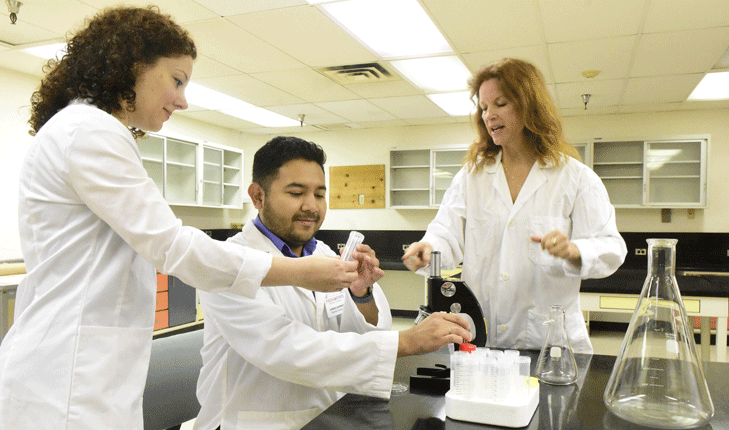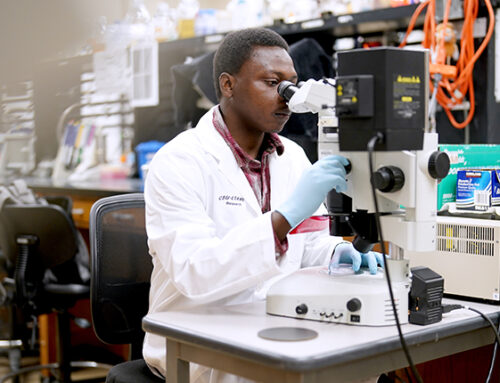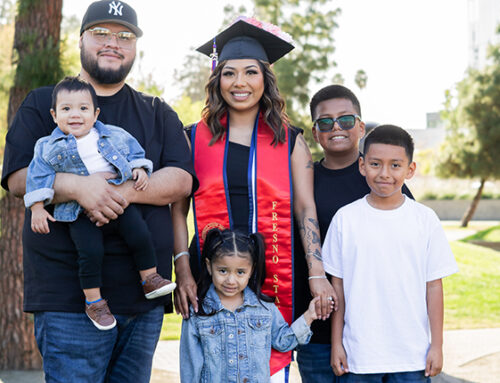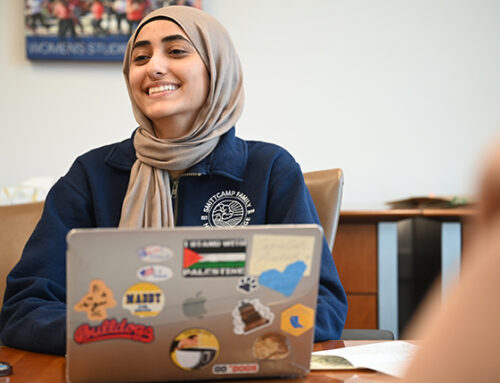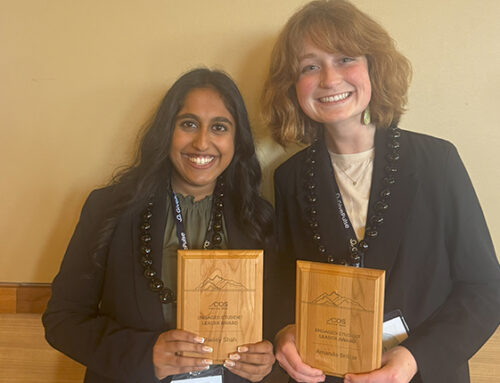When Jonas Gomez moved to Kerman from the small Central Mexican town of Morelos 10 years ago, he was exposed to a new world of food through his uncle who cooked many of the family’s meals.
That evolution is still the case today for Gomez, a Fresno State food science and nutrition graduate student who earned his bachelor’s degree through the Didactic Program in Dietetics program in 2019.
Since he arrived in the Central Valley, Gomez has become a vegetarian and pushed his family meals in new directions. Thanks to his knowledge and input, the family now has a more balanced mix of nutritional sources in their diet.
“My grandmother used to say that food makes people happy and brings them together, which is really important,” Gomez said. “My uncle has always made food from many cultures, so he has liked trying new recipes and ingredients, and it has also helped him better watch his cholesterol.”
Gomez, on a path towards becoming a clinical dietitian, will balance a busy class load this fall with research on an oral nutritional supplement program and its effects on patients undergoing major abdominal surgery.
The study, which focuses on a leucine byproduct (HMB) and patient rehabilitation, will be supervised by faculty member Dr. Shabnam Pooya and Dr. Amir Fathi from Community Regional Medical Center in downtown Fresno.
Students like Gomez, with a specific interest in science and laboratory research, are the targets of a new, human nutritional sciences undergraduate degree option.
The new pathway will increase students’ career options thanks to a mix of new classes, industry partnerships, internships and work-experience opportunities.
Students on a registered dietician nutritionist career path, one of the department’s most popular programs, are also accommodated by the new degree.
Both academic options share a similar initial route by studying nutrition fundamentals and the health benefits of various foods. As seniors, they will separate into two subgroups.
Registered dietician nutritionist students will focus mainly on clinical nutrition and medical nutrition therapy. Nutritional sciences students will examine cellular level metabolism more closely and learn molecular techniques that are used in labs, such as protein extraction and western blot.
To help design a new campus laboratory focused on nutritional science research, Pooya is working with the Ag One Foundation and Fresno State Foundation to raise funds.
The laboratory will give students hands-on training in key lab analysis methods, such as calculating lipids or antioxidants in blood samples, or comparing blood glucose levels after consuming high and low glycemic index foods.
Learning new lab techniques can help students better understand how eating habits can influence metabolism and cause or treat specific chronic and genetic disorders. These skills and additional science prerequisites will also prepare them for a specialized job market that includes medical, nursing and pharmaceutical positions that emphasize biology and biochemistry.
“This is a great option for students who have a strong interest in science and lab-related professions while expanding upon other courses we already offer in nutrition, culinology and food science,” Pooya said.
“Only one other university in the state of California offers a similar undergraduate degree, therefore it meets a key need that our community health providers and researchers need in studying health issues down to the molecular level.”
The fifth-year faculty member brings a host of experience exploring neurological and metabolic reactions in areas like glial cell signaling and vitamin deficiency topics tied to pregnancy, lactation and liver and heart diseases.
Her degrees and research have taken her around the world to esteemed universities in France and Iran; a didactic program degree at the University of Alabama in Tuscaloosa; and hospitals in Ohio and Wisconsin.
Among her classes this upcoming year, she will teach expanded courses on macronutrients (proteins, carbohydrates and lipids) and micronutrients (vitamins, minerals and fluids), as well as a research-based class that will prepare students for basic lab and clinical settings.
The new degree program will provide students with an understanding in metabolic, genetic and nutrition-related disorders that are commonly found in the Central Valley, such as obesity and malnutrition. Students and faculty hope to work directly with local health care professionals and community members, especially in underserved and economically-disadvantaged communities.
Incoming students learned about the new degree program this summer from Pooya and fellow faculty member Dr. Lisa Herzig at Dog Days orientation sessions before they scheduled their fall classes.
“When we talk about scientific topics like how genes can affect the way we are eating and vice versa, you see some students’ eyes light up,” Pooya said. “Being able to combine the research related to metabolism with our classes gives students such a wonderful and broad base of knowledge.”
Herzig is starting her 15th year on campus working with students in the registered dietitian, nutrition and physical assessment areas, and is equally excited about its possibilities.
“There is a definite demand in our area for these careers,” Herzig said. “This new degree gives health and nutrition counseling professionals, who work with individuals on a personal level, additional resources to be even more effective. This program takes our college to a new level as we zoom in from farm to fork principles to new areas that incorporate genetics, metabolism and health.”
Among grad student Gomez’s favorite labs as an undergraduate was one taught by Herzig in which students created nutritional meal plans for clients facing specific illnesses or health conditions.
Now, he is taking his studies to a new level to analyze cell signaling, human tissue reactions and related effects on proteins and mitochondria.
“I take pride in our family’s diet and how it has evolved and brought us together in new ways,” Gomez said. “There are many ways that nutrition can positively shape our lives, and so much of it comes from education and research.”

